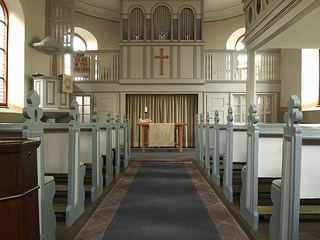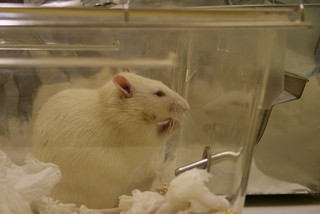Religion and science are sometimes portrayed as polar opposites – with pundits pointing to fights over the teaching of evolution in schools or media episodes such as Republican politician Marco Rubio’s suggestion that the age of the earth is up for debate. But America’s many vibrant religious traditions and beliefs are often more nuanced than oversimplified stereotypes pretend. My research looks at the attitudes of many kinds of religious believers, and focuses in detail on the specific ways conservative Protestants challenge modern scientific claims.
What Religious Americans Believe about Science
Many of the largest and most established U.S. religious traditions have little history of opposition to science. Liberal Protestants separated from conservative Protestants in part over support for modern ways of understanding the world, including science. Most Jewish traditions have no conflicts with science, and neither do Catholics in most realms of belief. The story is somewhat different for the conservative Protestant fundamentalists and evangelicals who today make up about a quarter of the U.S. population. They have long challenged certain scientific claims – in particular, the theory of evolution and scientific estimates of the age of the Earth.

Using nationally representative survey data, I recently compared the beliefs about science of the most conservative U.S. Protestants with the beliefs of Americans who say they do not participate in any religion. Using a strict definition, I defined conservative Protestants as the approximately 11% of the population who claim affiliation with a relevant denomination, attend church regularly, and take the Bible as literal truth. Here are some of my key findings:
- When we adjust for education and other important factors, conservative Protestants turn out to be just as likely as non-religious people to understand scientific methods and know scientific facts. They are also just as likely to have majored in science or work in a scientific occupation. Scholars have established that elite scientists who work at top U.S. research universities are less religious than other Americans. But ordinary people working in most occupations share the same beliefs as their neighbors and co-workers. Adherence to conservative religion as such does not reduce knowledge of science or the likelihood of holding a scientifically-based job.
- In a few areas where conservative Protestant theologies and scientific findings differ, religious conservatives are likely to believe their religion and depart from the scientific consensus – for example, about the origins of human beings or the age of the Earth. But that’s it. On other issues, conservative believers usually do not question scientific facts.
- Some say it is logically inconsistent to accept scientific methods and findings in some areas but not others. But logical consistency is not typical for most people most of the time. Academics may prize logic, but most people hold views that vary by the situations they find themselves in at different times.
Moral Turf is the Crux of the Matter
The key conflicts between conservative Protestantism and science are about values, not facts. Scientists believe their work is “value-free,” but many in the public do not agree. Indeed, conservative Protestants have always focused on moral messages in science. For example, William Jennings Bryan, the famed defender of creationism at the Scopes “monkey trial” of the 1920s, opposed evolution not just for contradicting the Bible, but also because he thought Darwinism had ruined the morals of German youth and helped to bring about World War I.
Today’s conservative Protestants, are less likely than non-religious Americans to grant scientists legitimate authority in public debates. Direct moral differences may be at work, as in conflicts over stem cell research. But differences over global warming, for example, do not seem to be similarly grounded in theology or passages found in the Bible. In that instance, conservative religious people may simply believe that scientists should not have authority in the public sphere – on any issue. They are skeptical about policy arguments that invoke scientific authority.

Other research I have conducted shows that opposition to the moral sway of scientists has grown in the past 25 years, because conservative Protestantism and science are invading one another’s turf. Back in the 1970s, debates invoking science were about the physical world and issues such as nuclear weapons. But after that, public debates started focusing on matters such as organ transplantation, the end of life and artificial technologies to influence reproduction – all realms that have been central to religion. Conservative Protestants also became more politically mobilized, and moved into debates such as the regulation of abortion.
Pinpointing the Important Conflicts
My research dispels myths by showing that religious people in the United States usually do not question science. Adherents of most faiths accept science, even when it looks at things differently than religious world views. Conservative Protestants are an exception, but even they only directly challenge a few factual scientific claims.
Major clashes have to do with who should shape society’s morals, and who can claim authority in political debates. Conservative Protestants have grown more willing to challenge science on that score, even when facts are not disputed. Scientists worry when some religious Americans dismiss findings on issues such as global warming. But from the perspective of conservative Protestants, scientists or leaders invoking science too often make overweening claims. Maybe the core differences have to do with long-sacred issues about human life and death, but conservative Protestant skepticism about scientific claims in those areas can spill over into a more general willingness to doubt science and scientists’ involvement in any and all public debates.We should sort out what really is at issue in different realms, and avoid oversimplified assumptions about “religion” versus “science.” To move toward more productive public debates, Americans need to lower the temperature and be clear about exactly where core religious beliefs do, and do not, clash with consensual scientific views.

 Research to Improve Policy: The Scholars Strategy Network seeks to improve public policy and strengthen democracy by organizing scholars working in America's colleges and universities. SSN's founding director is Theda Skocpol, Victor S. Thomas Professor of Government and Sociology at Harvard University.
Research to Improve Policy: The Scholars Strategy Network seeks to improve public policy and strengthen democracy by organizing scholars working in America's colleges and universities. SSN's founding director is Theda Skocpol, Victor S. Thomas Professor of Government and Sociology at Harvard University.
Comments 2
Matthew Braswell — June 3, 2013
One thing that fascinates me about criticisms of science is the staggeringly diverse range of perspectives that can give rise to them. On the one hand you have the current talk of Republicans as enemies of science and disbelievers in the objective truth of evolution and global warming. The Republicans are seen as clinging irrationally to their religious beliefs instead of the proven facts of science. But on the other hand, in the "Science Wars" era of the '80s and '90s (and still today, though the fervor has cooled), you had postmodernists and critical theorists critiquing science for what they saw as its phony objectivity and for being the handmaiden of existing structures of oppression and inequality. While I suspect that conservative Republicans would recoil at the notion of having anything in common with Science Warriors, and vice versa, I think it would be interesting to explore the similarities and differences between these two lines of critique and the responses they get.
Berit K — December 7, 2013
There exist this challenge, it is one of categorization and it goes like this:
What if there is an issue with the way one perceives religion?
I mean the fundamentalist who is he? Does he exist? Over here in Europe a fundamentalist is one which draw at least my thoughts toward terrorism and those things which one are scared of and abhors.
Still the word fundamentalist is used in this research and it is so hard to understand how a person who studies the bible can become a fundamentalist.
And is a fundamentalist one who is dogmatic? Does one become dogmatic when one study the bible and adhere to its principles? One needs to question these things. Because else one might instead of dispels myths but creates new myths.
If one read the bible on a daily basis and is not into politics am not into politics is one then a fundamentalist, or is it the politic preference which makes one a fundamentalist?
If one has to have a political preference to become a fundamentalist I know none, but if all it takes is to read the bible then where are we heading? Will it become a threat to read the bible?
More than that many of the people I know question science; they question science because pending how you see science, and when science as we see it today came into life, one can argue that climatic change is a product of science. Furthermore the problem of genetic modification to many got very little to do with a perception that one cannot of ethical reasons modify genetic matter, instead it has everything to do with playing with advance mechanisms which we know very little about and which long-term consequences we hardly know anything about.
To me it is prejudice thought to think that becoming Christians should make people stupid, limited, dogmatic or backward.
Seeing then that research not only answer question but it also partake in creating reality, I think one should perhaps look into this categorization, and how one perceive religion.